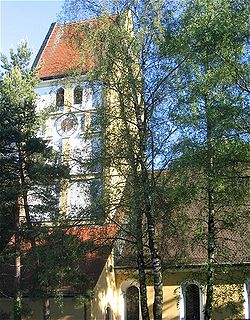Unterhaching
Unterhaching | |
|---|---|
Location of Unterhaching within Munich district  | |
| Country | Germany |
| State | Bavaria |
| Admin. region | Upper Bavaria |
| District | Munich |
| Government | |
| • Mayor | Wolfgang Panzer (SPD) |
| Area | |
| • Total | 8.73 km2 (3.37 sq mi) |
| Elevation | 556 m (1,824 ft) |
| Population (2023-12-31)[1] | |
| • Total | 26,079 |
| • Density | 3,000/km2 (7,700/sq mi) |
| Time zone | UTC+01:00 (CET) |
| • Summer (DST) | UTC+02:00 (CEST) |
| Postal codes | 82008 |
| Dialling codes | 089 |
| Vehicle registration | M |
| Website | www.unterhaching.de |
Unterhaching (German pronunciation: [ʔʊntɐˈhaxɪŋ]) is the second largest municipality in the district of Munich in Bavaria, Germany.
History

Based upon the discovery of graves, the settlement of the Haching Valley can be traced back as far as 1100 B.C. The settlement of the Bavarian tribes is believed to have occurred between the fifth and eighth centuries.
The name "Haching" comes from the family name "Hacho" and the aristocracy of the Hahilinga. The name Haching is first recorded in a document from the Schäftlarn monastery in the year 806, left by the abbott Petto. Therefore, Haching is hundreds of years older than Munich.
The name "Unterhaching" (lat. inferiori hachingin) emerges for the first time in the year 1180 in a possession listing of the bishop of Freising (Freesing).
Up until the 1803 secularization the surrounding monasteries were the primary landowners in the area. Also derived from this is the municipal coat of arms, which today shows the abbott staff of the Schäftlarn monastery and the sea-rose sheet from the coat of arms of the monastery Tegernsee. Unterhaching began the 20th century as purely a farming village. The number of inhabitants exploded from 616 inhabitants in 1900 to 20,545 in 2000.
In 1955 Unterhaching split from Ottobrunn and became an independent municipality.
In 1968 the building of two new large housing estates began, "Grünau" and Fasanenparks, which began the development of the City into a modern housing development.
Sports
Unterhaching is well known in Germany for its football (soccer) team SpVgg Unterhaching, which played in the Bundesliga during the 1999/2000 and 2000/2001 seasons. In 2001 SpVgg Unterhaching won the DFB-Hallenpokal.
The Unterhaching SpVgg also has a very successful bob-sledding team, with multiple world and European titles. The Olympic gold-medalist Christoph Langen is a member.
The volleyball department is just as successful TSV Unterhaching and played for six years in German Bundesliga (first division).
Economics
Unterhaching is the base for Develey, a manufacturer of mustards and other fine foods, and the headquarters for the chewing gum manufacturer Wm. Wrigley Jr. Company. The company Anton Schrobenhauser has become one of the largest building contractors in Munich and the surrounding areas.
Environment
The municipality Unterhaching and its enterprise Geothermie Unterhaching GmbH & Co KG are now able to profit from a combined heat and power plant exploiting geothermal energies. The project was successfully realized together with Rödl & Partner, a globally operating auditing and consultancy firm. It is the first German project in this dimension, as well as the first time to use the power generating technology known as the KALINA-process on an industrial scale in Germany.
The drilling works lasted about six month for each of the two boreholes. While the first drill hole was finished in fall 2004, the second was completed in winter 2007. The ecological and economic success of this project has been certain since geothermal waters with temperatures up to 133 °C (271 °F) and a delivery of around 150 l/s were developed in depths of up to 3,580 metres (11,750 feet).
International relations
Twin towns – Sister cities
Unterhaching is twinned with:
 Bischofshofen, Austria
Bischofshofen, Austria Le Vésinet, France
Le Vésinet, France Witney, United Kingdom
Witney, United Kingdom Adeje, Spain
Adeje, Spain Żywiec, Poland[2]
Żywiec, Poland[2]
References
- ^ Genesis Online-Datenbank des Bayerischen Landesamtes für Statistik Tabelle 12411-003r Fortschreibung des Bevölkerungsstandes: Gemeinden, Stichtag (Einwohnerzahlen auf Grundlage des Zensus 2011).
- ^ "Internetowy Serwis Miejski". zywiec.pl. 2008-06-20. Retrieved 2011-06-03.
External links
- Official community website
- Landkries München Unterhaching
- Official website: Rödl & Partner / Geothermal projects
- Official website of the municipal enterprise Geothermie Unterhaching

